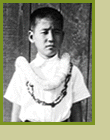
 |

Francis Mitsuo Tomosawa is born in Honolulu, Hawaii, on January 25, 1930. Both of his parents are Japanese natives, but the family has lived in Hawaii for years. Mitsuo is the youngest of three sons. In 1930 the Hawaiian islands are a U.S. territory. They will not become the 49th state for another 29 years. Even so, Mitsuo, like his two older brothers, is born a U.S. citizen. That status will both help and hurt Mitsuo in the years ahead. Mitsuo grows up in a world of two cultures. At his elementary school, everyone speaks English. After school each day, he goes to a Japanese-language school. To his friends, who come from many different backgrounds — Japanese, Chinese, European, Filipino, and native Hawaiian — he is Francis. At home, where he speaks Japanese to his mother and father, he is Mitsuo. His parents never master English beyond a few phrases. Mitsuo's father is a boat builder and carpenter and his mother works in a fish cannery. The family is poor, so the Tomosawas must work very hard to meet an important goal. Like most Japanese parents in Hawaii, they want Mitsuo and his brothers to know the country and culture of their ancestors by living in Japan for a time. In 1939, Mitsuo's oldest brother, is sent to Japan. He goes to Hiroshima, where his mother has an uncle. Two years later, it is 11-year-old Mitsuo's and his middle brother's, turn to leave for Japan. Their mother goes, too, to care for the boys. They head for Hiroshima, where they plan to rent a house. Mitsuo's father stays behind to continue working, so he can send money to his wife and children. Mitsuo and his family set sail for Japan in March 1941. They leave on a passenger ship, but there are also U.S. military ships docked in Hawaii. The U.S. Navy has a huge base at Pearl Harbor, about six miles from Honolulu. In seven months, Japanese aircraft will blow many of those ships to smithereens. Why was it so important to Mitsuo's parents that he and his brothers live in Japan for a while? What kinds of experiences would they have in Japan that they couldn't have in Hawaii? Discover what life was like in Hawaii during World War II through recorded memories and photographs. |